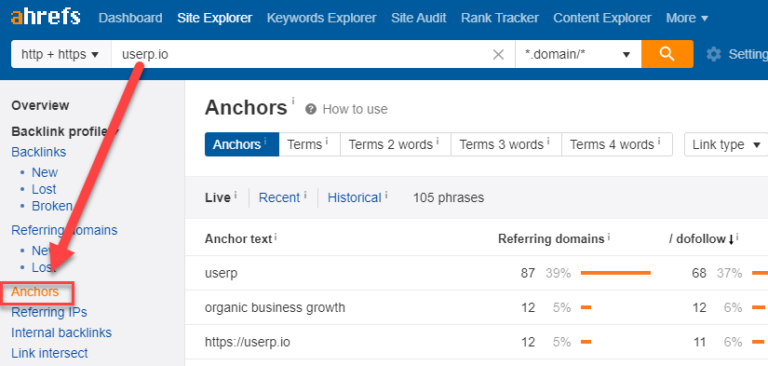Anchor text is a heavily debated topic among SEO professionals.
“Exact matches are the best!”
“Don’t ever get an exact match, unless you enjoy Google penalties!”
“Natural all the way.”
Sadly, none of these sentiments are helpful.
Does anchor text actually matter for link building and improving rankings?
How can you avoid potential penalties?
Here are a few things you need to know about anchor text when building and earning links.
1. Google Likes Exact Match… to an Extent
What I’m about to tell you might shock you.
Conversely, if you were the first person I quoted just above, it probably won’t.
Exact matches shouldn’t be as feared as they are.
There, I said it.
I know, your inner SEO pro is screaming.
You’re probably furiously thinking about tweeting how bad exact match anchors are.
But before you do, let’s talk about Google’s official stance.
Google says the following about utilizing anchor text effectively for both readers and search engines:
When you’re writing link text, use a phrase that describes what the reader will see after following the link.
Links should make sense without the surrounding text.
This is somewhat vague, but it’s simple: anchor text should describe what the reader gets when clicking on a given link.
If your anchor text is “link building strategies,” the user who clicked should be directed to a link building strategies post.
Simple, huh?
But, isn’t this exact match??
Isn’t exact match anchor text bad?
Yes and no.
According to Google, good link text contains “the exact text of the title or heading you’re referencing” or “a description of the destination page.”
Rather than using phrases like “click here” or “learn more,” Google actually prefers more exact match and closely related variations to the content users click on.
Why?
It provides a better user experience, and it’s easier for search engines to crawl.
Users know exactly what they are getting when they click.
And they only click if they want to learn more.
However, this doesn’t mean you should exploit this for rankings.
For instance, you shouldn’t be guest posting on 200 different sites and stuffing exact match anchors in every piece.
Every anchor shouldn’t be the same exact anchor.
Google identifies this as a direct link scheme, subject to penalties, manual action, etc.
The moral of the story: if you are acquiring lots of natural backlinks with exact or related match anchors, that’s fantastic.
You don’t need to panic or disavow exact match anchors.
Instead, just avoid mass scale schemes that exploit this, or you could risk penalties.
Use exact match sparingly, but come up with unique ways to describe the link you are referencing or obtaining that are still helpful to users reading.
2. You Can & Should Audit Your Anchor Text
Having hundreds of keyword exact match anchors is a recipe for red flags.
Especially if they comprise the majority of your backlinks. But, sometimes that’s just how you’ve acquired links naturally.
Thankfully, you can (and should) audit your current anchor text spread to find an ideal medium.
If you notice that hundreds of sites are linking to your “SEO guide” with the exact anchor, simply conduct outreach to these publishers and ask them to change the anchor.
It’s truthfully that simple.
Writers want to produce the most engaging piece for their readers.
Audit the existing anchor and backlink, and see if it can be improved or placed on a more relevant anchor.
Even if you only get 20/100 changed, that’s still a fantastic conversion rate and a great way to limit the total amount of exact matches you get.
Using Ahref’s Anchors report, you can display a spread of current anchor text and relevant metrics like referring domains, followed or nofollowed links, and more.

When looking to earn or build links, you can diversify the ability to link to your piece, too.
This in turn will diversify your anchors.
For instance, if you have a huge guide, consider adding video embed capabilities, or utilizing custom images to build citation links.
All in all, a well-rounded anchor profile is ideal.
Speaking of which, what does that look like?
3. Well-Rounded Anchors Are Ideal
Google likes exact matches (and variations), as long as you aren’t violating any guidelines with mass-scale link schemes.
With that being said, your entire backlink profile shouldn’t contain 100% exact match anchors.
Why?
It just isn’t realistic.
Most content creators or websites aren’t going to do exact keyword anchors every single time.
As much as Google says it’s natural and even preferred, the idea of exact match anchors still makes people wary.
Anchors can and should range from homepage branding to keyword variations and even quotes.
In fact, recent data shows that the top Alexa ranking sites have a natural anchor text profile containing a mix of:
- Branded anchors (for example, Search Engine Journal).
- Exact match anchors.
- General / randomized anchors.
- Image source anchors.
Top Alexa ranking sites have this mix because it’s natural at a large scale.
If you had 500 backlinks and each was exactly matched to your target page, that could signal to Google that you were manipulating their system, having control over all of these anchors.
While you won’t have control over anchor text for countless links you receive, when you do, start to assess your current anchor text spread.
If you have an overwhelming amount of keyword anchors, try using a branded anchor or reference something hyper-specific in the article.
Seek to establish a natural, mix of anchor texts that avoids any link scheme or system manipulation.
Conclusion
Anchor text can be a touchy, tricky subject for SEO pros and bloggers alike.
Knowing how and when to link to proper content isn’t easy. Google often sends mixed signals and fails to clarify grey areas.
With the latest resources, we can rest assured that exact match anchors are useful to Google and readers, so long as you aren’t violating any link schemes.
Having well-rounded anchors is always preferred if you ever have a say in the links you acquire.
Always look at your existing anchor text spread to determine if you have a well-rounded profile, and iterate based on performance.
More Resources:
- How to Use the Link Title Attribute Correctly
- How to Determine the Value of a Backlink
- How Google Handles Naked Links
Image Credits
Screenshot taken by author, October 2020





